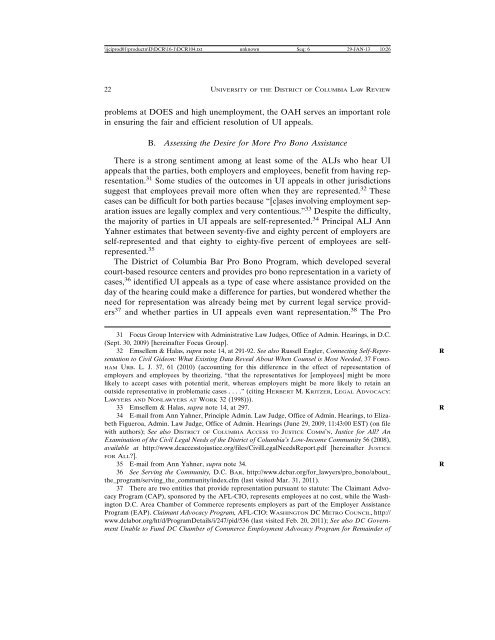volume 16, number 1 - UDC Law Review
volume 16, number 1 - UDC Law Review
volume 16, number 1 - UDC Law Review
- No tags were found...
Create successful ePaper yourself
Turn your PDF publications into a flip-book with our unique Google optimized e-Paper software.
\\jciprod01\productn\D\DCR\<strong>16</strong>-1\DCR104.txt unknown Seq: 6 29-JAN-13 10:2622 UNIVERSITY OF THE DISTRICT OF COLUMBIA LAW REVIEWproblems at DOES and high unemployment, the OAH serves an important rolein ensuring the fair and efficient resolution of UI appeals.B. Assessing the Desire for More Pro Bono AssistanceThere is a strong sentiment among at least some of the ALJs who hear UIappeals that the parties, both employers and employees, benefit from having representation.31 Some studies of the outcomes in UI appeals in other jurisdictionssuggest that employees prevail more often when they are represented. 32 Thesecases can be difficult for both parties because “[c]ases involving employment separationissues are legally complex and very contentious.” 33 Despite the difficulty,the majority of parties in UI appeals are self-represented. 34 Principal ALJ AnnYahner estimates that between seventy-five and eighty percent of employers areself-represented and that eighty to eighty-five percent of employees are selfrepresented.35The District of Columbia Bar Pro Bono Program, which developed severalcourt-based resource centers and provides pro bono representation in a variety ofcases, 36 identified UI appeals as a type of case where assistance provided on theday of the hearing could make a difference for parties, but wondered whether theneed for representation was already being met by current legal service providers37 and whether parties in UI appeals even want representation. 38 The Pro31 Focus Group Interview with Administrative <strong>Law</strong> Judges, Office of Admin. Hearings, in D.C.(Sept. 30, 2009) [hereinafter Focus Group].32 Emsellem & Halas, supra note 14, at 291-92. See also Russell Engler, Connecting Self-Repre- Rsentation to Civil Gideon: What Existing Data Reveal About When Counsel is Most Needed, 37 FORD-HAM URB. L. J. 37, 61 (2010) (accounting for this difference in the effect of representation ofemployers and employees by theorizing, “that the representatives for [employees] might be morelikely to accept cases with potential merit, whereas employers might be more likely to retain anoutside representative in problematic cases . . . .” (citing HERBERT M. KRITZER, LEGAL ADVOCACY:LAWYERS AND NONLAWYERS AT WORK 32 (1998))).33 Emsellem & Halas, supra note 14, at 297. R34 E-mail from Ann Yahner, Principle Admin. <strong>Law</strong> Judge, Office of Admin. Hearings, to ElizabethFigueroa, Admin. <strong>Law</strong> Judge, Office of Admin. Hearings (June 29, 2009, 11:43:00 EST) (on filewith authors); See also DISTRICT OF COLUMBIA ACCESS TO JUSTICE COMM’N, Justice for All? AnExamination of the Civil Legal Needs of the District of Columbia’s Low-Income Community 56 (2008),available at http://www.dcaccesstojustice.org/files/CivilLegalNeedsReport.pdf [hereinafter JUSTICEFOR ALL?].35 E-mail from Ann Yahner, supra note 34. R36 See Serving the Community, D.C. BAR, http://www.dcbar.org/for_lawyers/pro_bono/about_the_program/serving_the_community/index.cfm (last visited Mar. 31, 2011).37 There are two entities that provide representation pursuant to statute: The Claimant AdvocacyProgram (CAP), sponsored by the AFL-CIO, represents employees at no cost, while the WashingtonD.C. Area Chamber of Commerce represents employers as part of the Employer AssistanceProgram (EAP). Claimant Advocacy Program, AFL-CIO: WASHINGTON DC METRO COUNCIL, http://www.dclabor.org/ht/d/ProgramDetails/i/247/pid/536 (last visited Feb. 20, 2011); See also DC GovernmentUnable to Fund DC Chamber of Commerce Employment Advocacy Program for Remainder of














